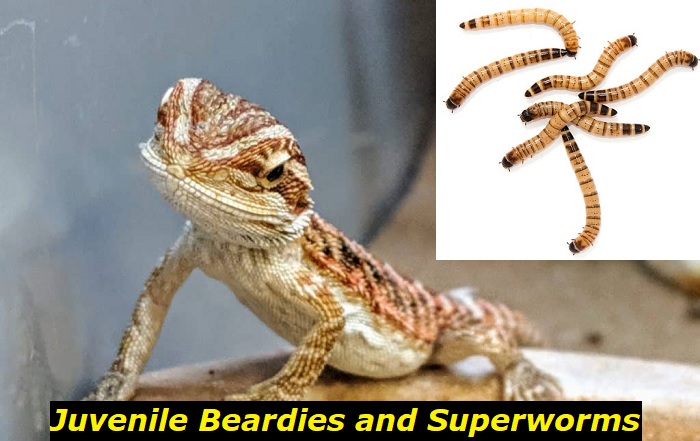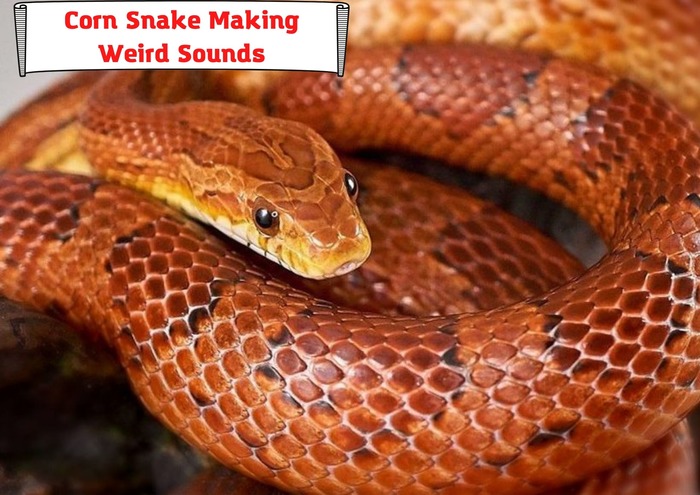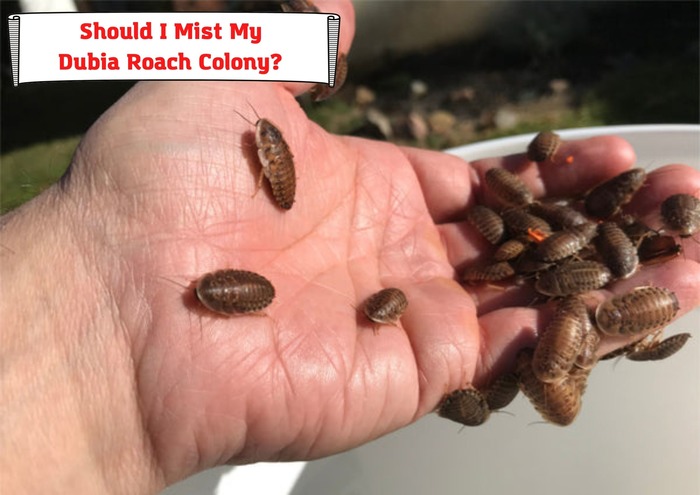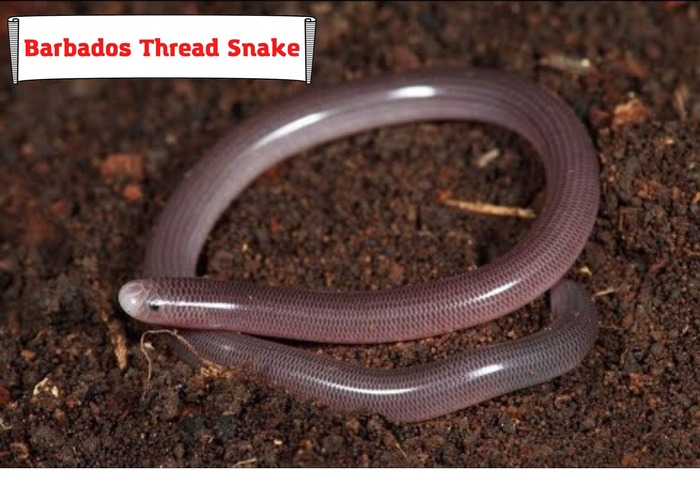Caring for your reptile is perhaps the most assuring display of affection and responsibility as a beardie owner. But caring for your bearded dragon comes with a task. You need to know what to feed your pet at every stage of its life. What was permissible at a young age may be forbidden for another phase of life.
For this reason, many beardie owners wonder if superworms are good for juvenile bearded dragons.
Well, here is the answer from our investigation for that concern. Read on to find out whether you can feed your juvenile bearded dragon superworms, how many you can provide, and how often you can feed them.

What Are Superworms?
Superwrorms are the larvae of the Zophobas morio, a species of darkling beetle. They are also called other names such as king worm, morio worm, and even Zophobas.
They are a common feeder insect in the reptile pet industry, bird keeping, and aquarium hobbies. These worms look like mealworms in terms of their segmented bodies. But they differ from mealworms because they are usually about five times bigger than mealworms. They also have more chitin in their exoskeletons than mealworms.
Superworms have an all-yellow to golden brown color like mealworms, but unlike mealworms, they have a dark head and end. It also has dark shades over its segmented body. It is high in protein and a good hydration source for insectivores.
They are easy to keep and great for insect feeders, but you want to check in with your vet to know whether it is a suitable feed option for your pet. Many reptile owners supplement the superworms with calcium because it has deficient calcium to phosphorus ratio.
Are Superworms Good for Juvenile Bearded Dragons?
Beardies are considered juveniles at the age of 2-7 months old. At this stage of their growth, they range in sizes from more than 9 inches to less than 18 inches. So, whether superworms are suitable for your juvenile beardies depends on how fast and big they are.
Superworms may not be ideal for younger juvenile beardies less than four months old. These younger guys may be too timid to attack and devour the superworm, and this can be dangerous because the superworms can attack and bite the shy bearded dragon.
But you can feed your older juvenile bearded dragons superworms. Ideally, juvenile bearded dragons four months old and more should be fast enough to pick and devour superworms. You want to be very careful when feeding them superworms because they have strong jaws and a head spike which can be a distasteful experience for your pet.
Watch it as it goes for the superworm. If it is too slow to eat the worm before its chance to bite it, you may want to delay such feeding. You want to rely on other feeder insects.
But if it is big and fast enough to display its natural predatory instincts as it sees the superworm, it is okay to feed it.
How Frequent and How Much Superworms Should I Feed My Juvenile Dragon?
It is best to feed superworms only as treats. This is because of their low calcium to phosphorus ratio and high-fat content.
Another reason you want to avoid feeding them as a staple meal is that their exoskeleton is such that your beardie can suffer impaction, having a large mass of fecal matter stuck in its rectum.
You also want to remember that superworms can bite and have a small pin-like structure on their backs for attacking. So they are better fed to full-grown beardies than youngsters.
Although your juvenile dragon may be able to eat more than an adult beardie, it would be best to feed it scarcely. You can feed your juvenile bearded dragon a superworm once or twice a week. It would be best to feed them freshly molted worms before they dry out and their skeletons become hard. Many reptiles prefer them soft like this.
Since they are still very soft at this stage, there is no doubt your beardie will love them.
For feeding frequency, a rule of thumb is the less, the better because you do not want your beardie to suffer impaction or any disorder of bone strength from the excess phosphorus and lean calcium that superworms offer.
You can also check with your vet, especially if your beardie has had any impaction issues lately, to know how many superworms to feed your pet.
It is important to also ensure that you are feeding the right size. If the worm you want to feed your reptile is bigger than the space between your eyes, then it should not be fed to your beardie. Your beardie might have trouble chewing and swallowing it.
But if the superworm is smaller than the space between your beardie’s eyes, then it is okay to feed it.
How To Present Superworms to Your Bearded Dragon
When it comes to feeding bearded dragons, presenting the food right is as important as choosing the right food.
It is best that you provide your bearded dragon live superworms. You can test their natural predatory instincts by placing the worm in front of them to see if they will chase and eat it. Another great way to go about it is to place the worm in the feeding bowl of the bearded dragon.
To battle the calcium deficiency, it would be best to gut load the superworm before feeding it to your bearded dragon. Dusting the worm with calcium powder may not be as effective as gut loading since the worm’s hard exoskeleton is too smooth and glassy for the powder to stay attached to it.
Unlike adult beardies dragons which you may use superworms to entice into a bowl of greens, it is best to serve the worm as a treat to your pet.
It would be best to feed them superworms after their fill of dubia roaches, crickets, or some other high-protein food. This will ensure that they do not become picky eaters and prefer fatty worms to their ideal diet.
It would also be best to feed them on a firm floor. Placing them on a substrate that they can burrow into is not ideal. They can easily burrow their way into the substrate and later constitute a nuisance to the bearded dragon.
Does Feeding Superworms Pose Health Risks to my beardies?
Generally, using superworms as treats is not likely to result in many health issues. But making these worms part of the staple food for your juvenile bearded dragon is likely to lead to health problems.
Superworms have a very low calcium to phosphorus ratio, they are almost calcium deficient. Remember that excess phosphorus and low calcium are some factors that can lead to weak bones in bearded dragons.
So, when you feed your juvenile bearded dragon superworms as a staple meal, your pet is at risk of metabolic bone diseases. The best way to avoid this is to give worms only as treats or snacks.
Another concern you want to keep in mind is that superworms have a very high-fat content. Using worms as a staple food puts your young beardie at risk of obesity. Apart from the danger of obesity, they will also become susceptible to malnutrition.
Since bigger superworms can be too aggressive and bite your beardie, you should also feed smaller worms instead. You also want to remove any leftovers from the beardie’s enclosure.
NOTE
Superworms are not ideal as a staple food in your bearded dragon’s diet. But there are some reasons you want to include them in your beardie’s diet as a treat.
Although they are high in fat content, which can lead to your beardie being obese, these fat reserves help female beardies cope with the toll of hosting eggs.
Superworms are also an excellent way to provide fiber for your juvenile beardie.
Conclusion
Whether you can feed your juvenile bearded dragon superworms depends on how old and big the beardie is. For younger ones, feeding worms may be a bad decision. It could lead to health issues such as impaction and others. But this may not be the same for older pets.
Besides considering their size and age, you also want to pay attention to their response when presenting the worm. If your juvenile beardie is too slow, it would be best to offer superworms sometime later after it has grown some more.
But if your juvenile bearded dragon actively exhibits its natural predatory instincts, you can continue to offer superworms. However, as mentioned above, you want to be careful with the frequency of offering superworms.
- Dubia Roach Egg Sack: How To Understand if It’s Healthy? - January 2, 2023
- How To Feed African Dwarf Frog While on Vacation? - December 26, 2022
- Baytril for Bearded Dragon: Here’s What You Should Know - December 19, 2022



